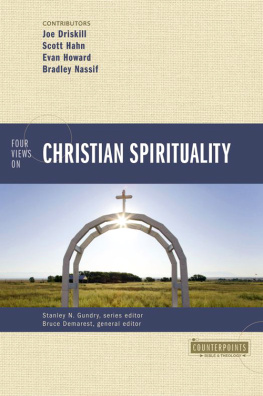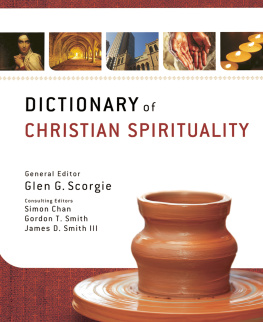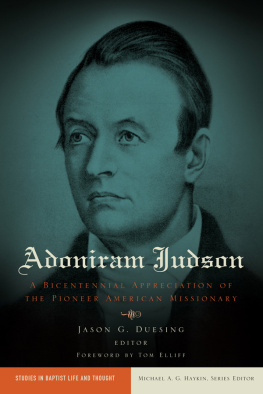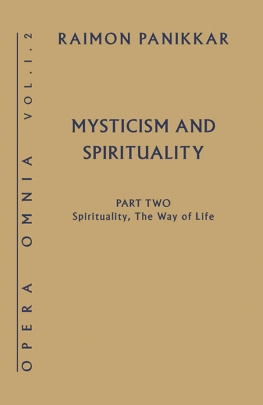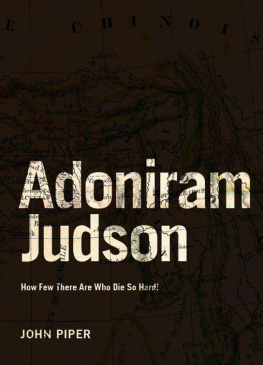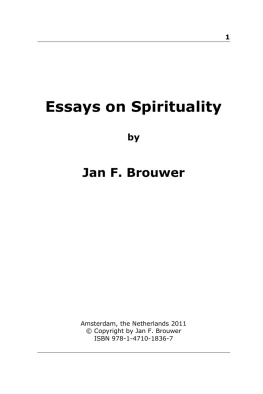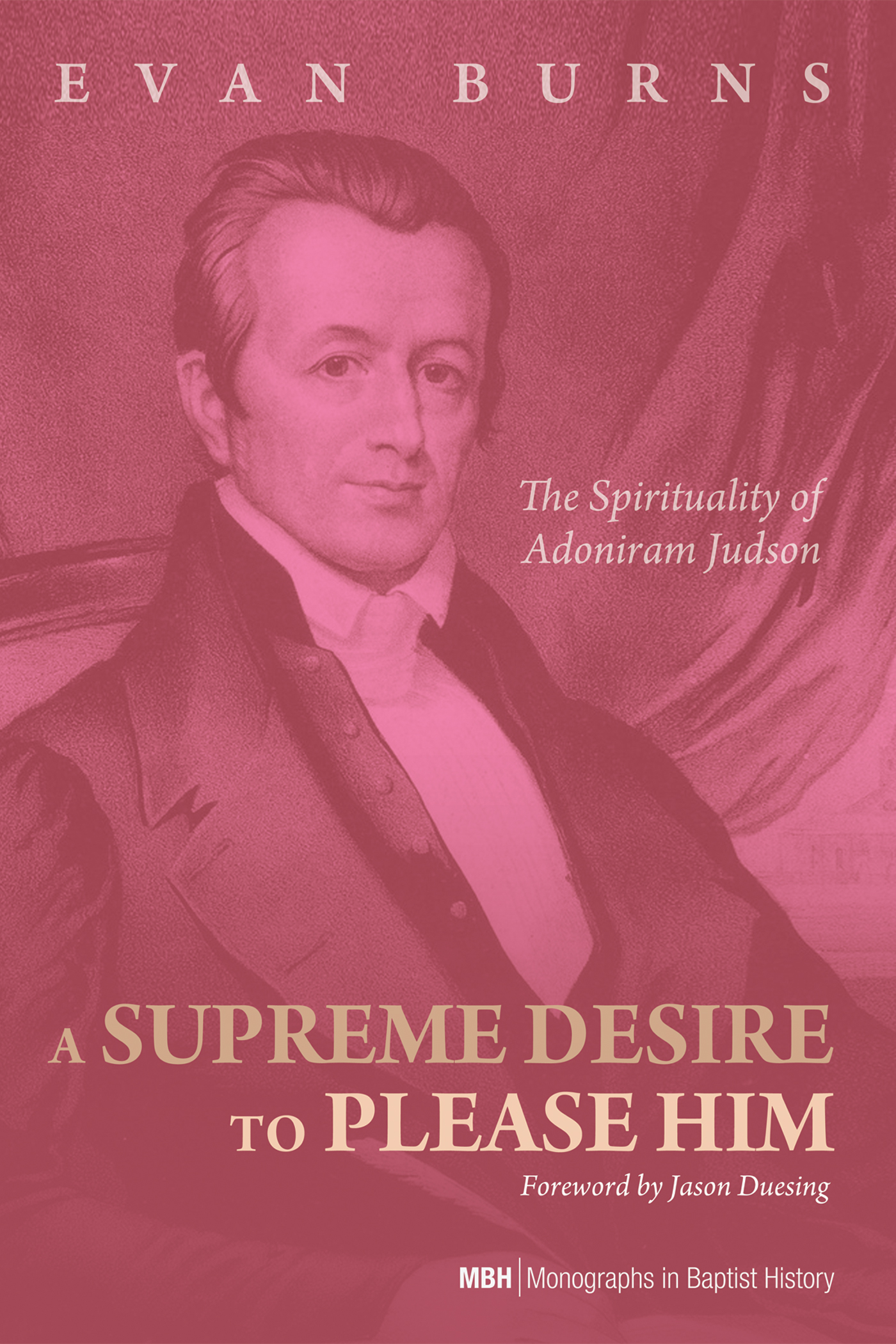The early modern missionary movement was decisively shaped by a number of iconic figures: among the chief of them was Adoniram Judson. This original and incisive study of his piety helps us not only understand his life and what made him tick but also the pattern of missionary piety that came after him. A great study!
Michael A. G. Haykin
Professor of Church History and Biblical Spirituality, The Southern Baptist Theological Seminary
Adoniram and Ann Judson have always been heroes to me for a host of reasons: their courage to obey the Great Commission, to explore biblical truth as it related to baptism, to act on what God showed them even at great personal cost, and to remain faithful in missions though great suffering. Evan Burns provides insightful analysis of Adoniram Judsons spiritual fortitude that enabled endurance, which I pray will spark a supreme desire to please Him among many readers.
M. David Sills
DMiss, Ph.D., A.P. and Faye Stone Chair of Christian Missions and Cultural Anthropology, The Southern Baptist Theological Seminary
Monographs in Baptist History
volume
Series editor
Michael A. G. Haykin, The Southern Baptist Theological Seminary
Editorial board
Matthew Barrett, California Baptist University
Peter Beck, Charleston Southern University
Anthony L. Chute, California Baptist University
Jason G. Duesing, Midwest Baptist Theological Seminary
Nathan A. Finn, Union University
Crawford Gribben, Queens University, Belfast
Gordon L. Heath, McMaster Divinity College
Barry Howson, Heritage Theological Seminary
Jason K. Lee, Cedarville University
Thomas J. Nettles, The Southern Baptist Theological Seminary, retired
James A. Patterson, Union University
James M. Renihan, Institute of Reformed Baptist Studies
Jeffrey P. Straub, Central Seminary
Brian R. Talbot, Broughty Ferry Baptist Church, Scotland
Malcolm B. Yarnell III, Southwestern Baptist Theological Seminary
Ours is a day in which not only the gaze of western culture but also increasingly that of Evangelicals is riveted to the present. The past seems to be nowhere in view and hence it is disparagingly dismissed as being of little value for our rapidly changing world. Such historical amnesia is fatal for any culture, but particularly so for Christian communities whose identity is profoundly bound up with their history. The goal of this new series of monographs, Studies in Baptist History, seeks to provide one of these Christian communities, that of evangelical Baptists, with reasons and resources for remembering the past. The editors are deeply convinced that Baptist history contains rich resources of theological reflection, praxis and spirituality that can help Baptists, as well as other Christians, live more Christianly in the present. The monographs in this series will therefore aim at illuminating various aspects of the Baptist tradition and in the process provide Baptists with a usable past.
Introduction
It seems to be a divine law that those who bestow roses must feel thorns. The diamond of his piety glistens upon the dark cloth of Gods inscrutable providences.
In an era of great American folk heroes such as Daniel Boone ( 1820 ) and Davy Crockett ( 1786 1836 ), and legendary ventures such as the Lewis and Clark Expedition ( 1806 ), many hailed Judson as an exemplar even before his death. His contemporaries considered him to be among men who,
do not represent the spirit of their age, or the opinions of a people; they are prophets of the future; they represent ideas which, struggling for mastery, become the property of succeeding times. They identify their fortunes with the success of a principle; they enshrine in their hearts some great truth, unwelcome to their generation, and feel themselves impelled to go forth as its heralds, to conquer as its champions, or die as its martyrs. Among the men of this higher order, as far as the elements of character are concerned, Adoniram Judson holds a distinguished place.
Judsons seraphic zeal
Though eminent in his home country, Judson was also renowned in and around Burma as Jesus Christs man who published writings, telling of the eternal God:
Others come from the frontiers of Kathay, a hundred miles north of AvaSir, we have seen a writing that tells about an eternal God. Are you the man that gives away such writings? If so, pray give us one, for we want to know the truth before we die. Others come from the interior of the country, where the name of Jesus Christ is a little known Are you Jesus Christs man? Give us a writing that tells about Jesus Christ.
Judsons reputation in Burma as a disciple of Christ accordingly spread to the United States where his supporters likewise recognized him as such a man. He arrived back in the United States in the fall of 1845 , and while he was attending a special meeting of the Triennial Convention in New York, The mover of the resolutions... presented [Judson] to Dr. [Francis] Wayland with the expressive and well-understood words: I present to you Jesus Christs man . This apropos title exemplifies the Christ-centered spirituality of Adoniram Judson.
Status Quaestionis
Although the story of Adoniram Judson has become legendary, there has never been a systematic synthesis and study of his spirituality. The attraction of Judsons life is evident in the dramatic ways in which his biographers highlight the tragedy, romance, and triumph of his story; undoubtedly, the numerous times his biography has been rewritten using the same sources and sketching the same events reveals the allure of his lifes story. More than the incredible tragedy and adventure of his account, truly his enduring piety has made his story seem so other-worldly, inimitable, and worthy of retelling.
The nineteenth century witnessed the publication of biographies, which had accessed volumes of primary source material. Of these, the biography that stands at the headwaters is the two-volume work by the president of Brown University and Baptist pastor, Francis Wayland ( 1796 1865 ).
Published within a year of Waylands biography, Robert T. Middleditchs ( 1825 1907 ) biographical account liberally quoted many of the same primary source extracts used by Wayland. Middleditch certainly highlights those trials in Judsons life where his piety shone brightest.
Asserting that Waylands biography had gone out of print and that there was a need for recollecting Judsons unique personal traits for new readers, Judsons son, Baptist pastor and professor, Edward Judson, compiled a consecutive story of Judsons life, using original journals and letters that were available to Wayland. Edwards biography uniquely includes some of Judsons sermons and tracts to which Wayland only referred partially.
Though not a biography on Judson himself, James D. Knowless ( 1838 ) biography of Judsons first wife, Ann Hasseltine ( 1789 1826 ), provides much insight into Judsons spirituality.
Other early biographers and writers that deserve mention for their extensive, though not always unique, citations that illustrate Judsons remarkable piety are: Ann H. Judson, J. Clment ( 1815 1883 ), A. D. Gillette ( 1807 1882 ), James L. Hill ( 1848 1931 ), John Dowling ( 1807 1878 ), Daniel C. Eddy ( 1823 1896 ), William Hague ( 1808 1887 ), J. Nelson Lewis ( 1836 1863 ), William Carey Richards ( 1818 1892 ), Asahel C. Kendrick ( 1809 1895 ), and Emily C. Judson.
In the twentieth century, Stacy R. Warburton ( 1875 1940 ), seeking to reintroduce the Judson narrative for a new generation, contributed a new biography for the new century. He also offered succinct remarks and analyses of significant aspects of the Judson drama.




